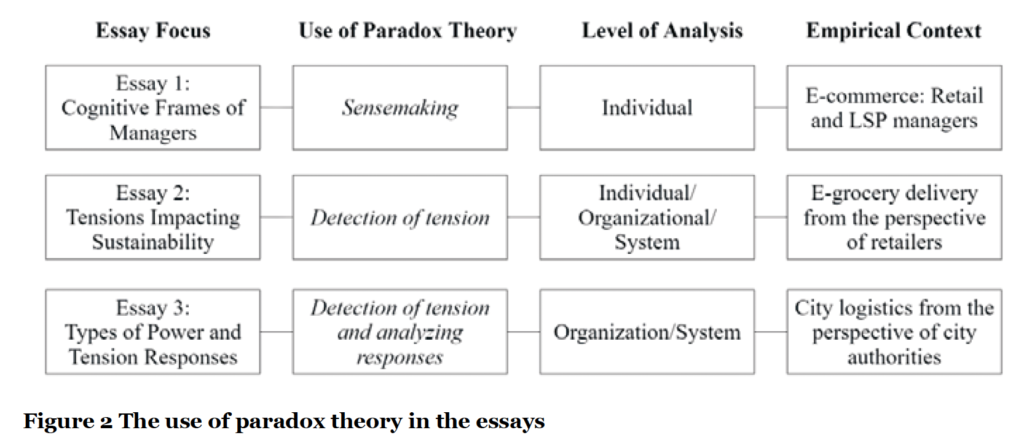As societal challenges intensify and business practices shift, Helleke Heikkinen’s thesis encourages a fresh perspective on sustainability in last-mile delivery (LMD) and urban logistics. It calls upon managers, policymakers, and researchers to engage in collaborative discussions and adopt a paradoxical approach to sustainability.
In an age of rapid urbanization and the rise of e-commerce, the importance of LMD and city logistics is undeniable. This thesis explores the complexities of LMD, highlighting that, although it represents the final step in the supply chain, its impact is substantial. The Covid-19 pandemic fueled a surge in online shopping, bringing LMD to the forefront and introducing new challenges. This delivery spike has become critical for e-commerce businesses while significantly straining cities and rural communities. The increase in urban and suburban freight traffic has led to higher emissions and other issues, especially when sustainability is a priority for city planners, businesses, and consumers alike.
The emphasis on sustainability arises as society and industries grapple with pressing issues like climate change, biodiversity loss, and other large-scale societal challenges. These challenges often create conflicting demands across different business sectors, highlighting the need for a balanced approach that addresses sustainability’s environmental and social dimensions. Consequently, LMD and urban logistics sustainability are more crucial than ever, demanding innovative strategies and cooperative efforts to reduce negative impacts.
Sustainability tensions
The thesis presents the results of three essays. Each essay contributes to understanding why a fundamental shift in the systemic perspective—what could be called a “dialectical transformation”—is unlikely to occur when addressing sustainability in last-mile and city logistics. The essays highlight sustainability tensions, offering insights for further research and practical application.

First, Essay 1 argues that managers primarily view sustainability through a hierarchical lens focused on emission reduction. As a result, other dimensions of sustainability are likely to gain attention only if this underlying perspective changes. Next, Essay 2 examines the e-grocery sector, revealing a paradox rooted in a profit-centered, instrumental approach that limits the likelihood of a broader reframing of sustainability. Finally, Essay 3 concludes that the private sector holds power that the cities are not expected to grasp, given their ambivalent response towards their potential power and using it to develop sustainable city logistics.
Expanding the concept of sustainability beyond just carbon emissions
This thesis emphasizes the importance of expanding the concept of sustainability beyond just carbon emissions. While reducing emissions is crucial, it is only one part of a larger sustainability picture within last-mile delivery and the broader supply chain. The thesis points out that other critical issues—such as different types of pollutants, biodiversity, and social factors like safety and accessibility—are often overlooked. The dominant instrumental and hierarchical view on sustainability limits managerial understanding, preventing it from encompassing these diverse aspects. Additionally, while social sustainability may receive attention in parts of the supply chain, many retailers compartmentalize it, viewing social concerns as relevant only to downstream segments. By adopting a more paradoxical approach to sustainability, a collaboration between retailers and logistics service providers (LSPs) could help integrate a broader range of sustainability considerations into last-mile delivery (LMD).
Furthermore, this thesis advocates for more explicitly acknowledging the tensions within sustainability practices and their implications for managers and city authorities. By highlighting tensions in e-grocery delivery and urban logistics, the thesis offers a starting point for unraveling the complexities of sustainability in LMD and city logistics. As shown in Essay 2, it is not individual tensions alone that influence sustainability outcomes, but rather how they are interconnected within the reorganization of work. By becoming aware of these dynamics, retailers could explore ways to address tensions and find solutions that benefit both business and sustainability, such as leveraging return flows for a circular economy or aligning customer expectations with actual sustainability impacts.
A third insight from this thesis is that the prevailing instrumental view of sustainability, illustrated across the three essays, poses a barrier to effectively balancing sustainability tensions. This thesis argues for a shift toward paradoxical thinking in managerial practice, where tensions become visible and actionable. For sustainability tensions to generate positive change, they must be acknowledged, and those involved must choose to act on them within their spheres of influence.
Finally, the thesis identifies power dynamics as crucial in sustainability discussions. From a paradox theory perspective, the thesis encourages managers to reflect on their power positions and the impact of power dynamics on sustainability in last-mile and city logistics. In urban logistics, for instance, using “process power” through collaboration, coordination, and open communication can help address, accept, and balance tensions. Cities should also recognize their “resource power” and “system power” to be more active in fostering sustainable urban logistics development.
